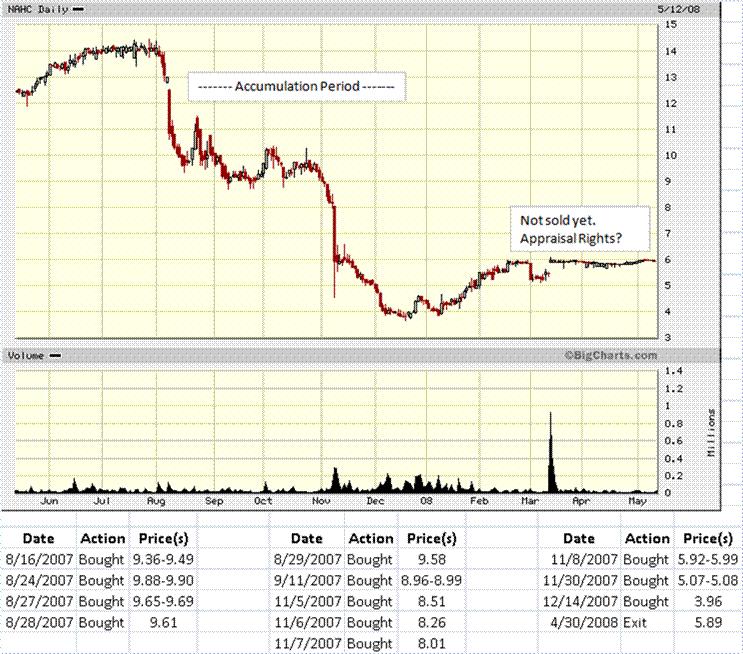
This will be the last of my institutional error pieces. It is not that I have not made any other errors, but these were the big ones.
National Atlantic Holdings [NAHC]
I was wrong yesterday. ?I actually do have a lot available that I have written on this failure, since I wrote about it here at Aleph Blog. ?More than you can shake a stick at.
Let me start at the beginning. ?NAHC was an insurer with a niche presence in New Jersey. ?They competed only in personal lines, which usually is easy to analyze. ?New Jersey was a tough but not impossible state to operate in, and NAHC was a medium-sized fish for the size of the pond that they were in.
Chubb was not in NewJersey at that point in time, and so they wanted to insure autos, homes, and personal property, particularly that of wealthy people.
I thought it was an interesting company, trading slightly below tangible book, with a single-digit multiple on earnings, good protective boundaries, and a motivated management team. ?The CEO owned over 10% of the firm, which seemed to be enough to motivate, but not enough to ignore shareholders.
In 2005, we bought a 5%+ stake in the company, which in 2006 became 10%+, and eventually topped out at 17%. ?We might have bought more with the approval of the NewJersey Department of Insurance, which was easy at lower levels, and harder at higher levels, which was an interesting anti-takeover defense.
The company showed promise in many ways, but always seemed to have performance issues — little to medium surprises every few quarters. ?The stock price didn’t do that much bad or good. ?When I left Hovde at the end of July 2007, the position was at a modest gain. ?Hovde had a hard time finding long names in that era, so the performance up to that point wasn’t that bad.
If you want to see my original logic for buying the stock after I left Hovde, you can read it here.
Here was the stock price graph from May 2007 to May 2008:
My old employer Hovde owned 17%. ?I eventually owned 0.15%, at the prices you see there, at an average cost of $6.67 for me. ?I eventually sold out at an average price of around $6.10. ?(In the above graph, “Exit” was not a sale, but where I cut off the calculation.) ?This wasn’t my worst loss by any means, but it cost my former employer badly, and it was my fault, not theirs.
What Went Wrong?
- Their competitive position deteriorated as companies that previously avoided New Jersey entered the state.
- They announced that they had reserving errors, and reported moderate?losses as a result.
- They announced a sale to Palisades Insurance, a private New Jersey insurer for $6.25/sh, valuing the company at less than 60% of tangible book value. ?The fairness opinion was a bad joke. ?The company would have been worth more in run-off.
- Really, the management team was weak.
The first problem would be a tough one to solve. ?On the second problem, I never got a good answer to how the loss reserves got so cockeyed, and somehow no one was to blame for it. ?This is personal lines insurance — the reserves validate themselves every year.
But the third problem made me think the management was somewhat?dishonest. ?A larger company could have paid a higher price for NAHC, but that probably would have meant that management would lose their jobs. ?They gave shareholders the short end of the stick for the good of management, and perhaps employees.
My biggest error was giving too much credit, and too much patience to the management team. ?I met far better management teams in my time as a buy-side analyst, and they were on the low end of the competence scale. ?I let cheapness and a strong balance sheet blind me to the eroding competitiveness, and weak ability to deal with the problem.
Ultimately, Hovde found itself in a weak position because it could not file for appraisal rights, a fraud case would have been weak, and the NJ Department of Insurance would not let them acquire enough to block the deal. ?Besides, once arbs got a hold of over 40% of the shares, the deal was almost impossible to block.
As I often say, risk control is best done on the front end. ?On the back end, solutions are expensive, if they are available at all.
The front end for you can be learning from my errors. ?Wise men learn from the mistakes of others. ?Average men learn from their own mistakes. ?Dumb men never learn.
In closing, be conservative in investing, and be wise. ?I thought I was being both, so seek the counsel of others to check your logic.


One thought on “Learning from the Past, Part 5c [Institutional Stock Version]”